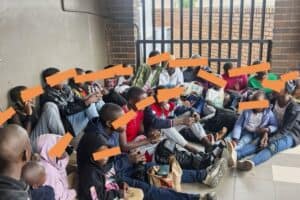The bodies of 49 anti-apartheid activists have finally returned home, though the EFF says this is a drop in the ocean.

A political expert and the Economic Freedom Fighters (EFF) have agreed the return of the bodies of struggle stalwarts to South Africa was long overdue.
For the EFF, this delay demonstrates the African National Congress’ (ANC) friendly relations “with the descendants of apartheid architects”.
Bodies of 49 finally return home
The South African government organised the repatriation of the remains of about 49 freedom fighters and anti-apartheid political leaders who died in Zambia and Zimbabwe.
A homecoming ceremony was held for them at Waterkloof Airforce Base on Wednesday, as the country heads towards the end of Heritage Month.
Minister of Sport, Arts and Culture, Gayton Mackenzie and Minister of Defence and Military Veterans Angie Motshekga were there to receive the bodies along with surviving family members of the liberation fighters.
The bodies of Advocate Duma Nokwe, Florence Mophosho and Basil February were among them.
ALSO READ: Finally coming home to SA: Who are the struggle heroes to be repatriated from Zambia, Zimbabwe?
Watch a family member of February discuss what this means to them:
Return of bodies ‘should have taken five years’
Political analyst Dr Ntsikelelo Breakfast applauded all the parties featured in the government of national unity (GNU) for agreeing to the ANC-proposed initiative to return the remains.
However, he was at a loss when speculating on the reason for the 30-year delay.
“It proved a cumbersome process and it really should have happened a long time ago. In my opinion, it should have taken no more than five years,” he told The Citizen.
The analyst said perhaps the different political parties the stalwarts belonged to took time consulting each other, but it was still hard to fathom that it could lead to such a delay.
Despite this, Breakfast said families could now find closure as they buried their kin.
“These people laid down their lives for freedom and it was good that they received historical appreciation of their contribution.”
EFF welcomes ‘long-overdue’ repatriation
On Thursday, the EFF released a statement welcoming the ‘long-overdue’ repatriation.
“We honour their contributions and express our deep gratitude to the governments of Zimbabwe and Zambia for their solidarity and support during the liberation struggle,” the EFF said.
“This repatriation, however, reminds us of the freedoms the ANC-led government has squandered over the past three decades, forming alliances with the descendants of apartheid architects.
“We expect the continued repatriation of over 1 000 freedom fighters still buried across the world, and we stand in solidarity with the families of these fallen heroes and honour their legacy.”
ALSO READ: Pravin Gordhan will be vindicated
About the repatriated
• Duma Nokwe became the first black advocate to be admitted to the Bar in 1956. He played an integral part in the resistance against the apartheid government and dedicated his life to ensuring the Constitutional rights and freedoms that he did not live to enjoy. He died in Lusaka, Zambia, on 12 January 1978. The Duma Nokwe Group of Advocates was established in his honour.
• Florence Mophosho helped organise the Congress of the People and later became a full-time organiser for the African National Congress (ANC). She was involved in the women’s movement and mobilised women in Alexandra for the Transvaal demonstrations against the passes for African women. She mobilised women to participate in the nationwide anti-pass women’s march on 9 August 1956, now marked by Women’s Day. While in exile in Germany, she delivered many public speeches. She was elected to the national executive committee of the ANC in 1975, where she fought for women’s rights and liberation. She died in Lusaka on Women’s Day, 9 August 1985
• Basil February was a vocal activist and even sprayed graffiti in protest against the apartheid government. He twice landed in prison for this. February left the country for military training in 1964 and changed his name to Paul Peterson. He became an asset to Umkhonto we Sizwe (MK) and contributed several articles to the MK Journal Dawn. He was killed when he and his guerrillas encountered an unexpected roadblock in Rhodesia. South African History Online describes the incident: “It is reported that February put up a brave fight, and in the process risked his life for his fellow comrade by helping them escape while he stayed behind.”






